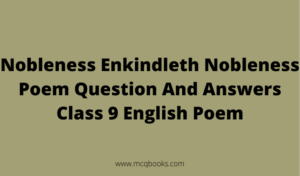Nobleness Enkindleth Nobleness Poem Question And Answers Karnataka Board Class 9 English Poem
English is a difficult subject for many people to learn. Some students may become frustrated and give up, but here’s Nobleness Enkindleth Nobleness Poem Question And Answers Karnataka Board Class 9 English Poem to help you maintain your momentum! This Nobleness Enkindleth Nobleness Poem Question And Answers will provide all necessary information needed in order to study KSEEB Class 9 English successfully at home or school; it includes detailed grammar rules with examples that were used during today’s class discussion on Karnataka Board English Exam.
The Nobleness Enkindleth Nobleness Poem Question And Answers, Chapter 6, Karnataka Board Class 9 makes it easier to understand the story. Understanding every detail of a story is important for scoring higher on an exam and expert writers have made sure that you know how everything flows together by summarizing perfectly!

About the poet:
James Russell Lowell was born in Cambridge, Massachusetts, United States in 1819. He was born to Reverend Charles Lowell and Harriett Brackett Spence Lowell. He was a romantic poet, an editor and a critic also. Also he went to the Harvard College and graduated in 1838. He expressed his views about social issues like anti- slavery through his poems. He believed that poetry is linked to various other factors. That includes religion, nature and social reform. He had also received a law degree from Harvard Law School.
In the beginning of his carrier the concept of “Swedenborgianism” had influenced him a lot.
Some of his well-known poetry collections include “A Year’s Life” (1841), “A Fable for Critics” (1848), “Poems” (1848), “Under the Willows” (1869), “Heartsease and Rue” (1888). He has also written various essays like “Conversations on the Old Poets” (1844), “Among My Books” (1870), “Democracy and Other Addresses” (1886), “Political Essays” (1888) and a lot more.
He passed away on August 12, 1891 at the age of 72.
Important word meanings:
- Behold: To see something.
- Outcast: an individual expelled from the community.
- Hath: Has.
- Nay: No/ No.
- Ere: Before.
- Decree: Judgement.
- Avenge: Take revenge.
- Enkindleth: Kindles.
- Hast: Has.
Theme of the poem:
The poem revolves around the idea of kindness and generosity. According to the poet, these two factors can give us immense happiness in life.
Text book solutions:
Who came to Yussouf’s tent one night?
Ans: A stranger came to Yussouf’s tent one night. He was an outcast.
What did he say?
Ans: The stranger told Yussouf that he was an outcast. Enemies were chasing him. He also needed shelter for the night.
Did he go to the tent for food and shelter?
Ans: Yes, he went to the tent for food and shelter.
Was Yussouf called “The Good”?
Ans: Yes, the whole tribe called Yussouf “The Good”.
Was Yussouf kind to the stranger?
Ans: Yussouf was very kind to the stranger.
Did Yussouf believe in God?
Ans: Yussouf believed in God. He believed that everything belonged to God.
What did Yussouf say, waking up the stranger?
Ans: Yussouf woke up the stranger. He then said,
“Here is gold,
My swiftest horse is saddled for thy flight,
Depart before the prying day grow bold.”
Yussouf asked the stranger to leave before the say begins. He also gave him some gold and a horse to help him travel.
What made the stranger’s face grand?
Ans: The kindness and generosity that Yussouf showed, made the stranger’s face grand.
Who killed Yussouf’s son?
Ans: The stranger, Ibrahim, had killed Yussouf’s son.
Did Yussouf get angry?
Ans: Yussouf was not at all angry.
What did Yussouf say to Ibrahim?
Ans: Yussouf asked Ibrahim to leave along with thrice the amount of gold. He told him to escape the black.
Who did Yussouf yearn for day and night?
Ans: Yussouf yearned for God and nobleness day and night. Initially, he had wanted revenge for his son’s death.
How has the poet described the stranger?
Ans: The poet has mentioned that the stranger was an outcast. Enemies were chasing him. He was in dire need of shelter and food. Yussouf helped him. The outcast was touched by this generosity of Yussouf. Overwhelmed by this, the stranger, Ibrahim, confessed killing his son. Despite this, Yussouf helped him escape by giving him gold and a horse.
Pick out the lines which show Yussouf’s respect for God.
Ans: Following are the lines that show Yussouf’s respect for God:
“it is God’s; come in, and be at peace”
“his glorious roof of night and day”
“Balanced and just are all of God’s decrees”
Explain: “As one lamp lights another, nor grows less, so nobleness enkindleth nobleness.”
Ans: Yussouf had offered shelter to a stranger. His nobleness touched the stranger. The stranger confessed killing Yussouf’s son. Yussouf’s kindness converted him into a kind man. The statement “As one lamp lights another, nor grows less, so nobleness enkindleth nobleness” stands true since ages. Kindness changes people. It inflicts kindness in others as well.
Which line gives the idea that God is impartial?
Ans: The line that gives the idea that God is impartial is: “Balanced and just are all of God’s decrees”.
What message does the poet give us through this poem?
Ans: The poet focuses on the idea of kindness and generosity. According to the poet, these two factors can give us immense happiness in life.
Which line do you like the most and why?
Ans: The following line is the most touching one in the poem: “As one lamp lights another, nor grows less, so nobleness enkindleth nobleness.” Kindness changes people. It inflicts kindness in others as well.